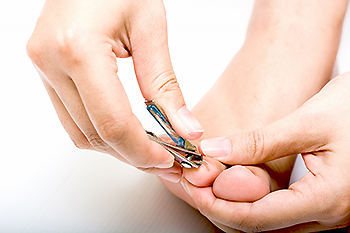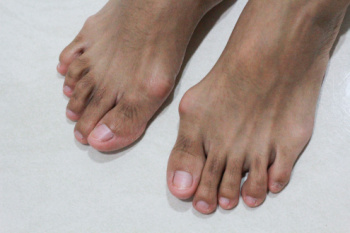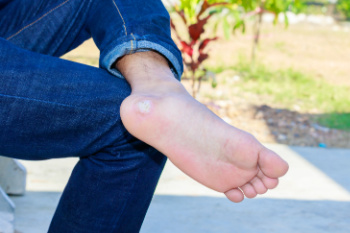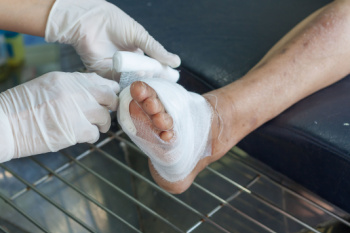Items filtered by date: August 2024
How to Cut Toenails Properly

Proper toenail care is important for maintaining foot health and preventing issues like ingrown toenails and infections. Start by soaking your feet in warm water for about 10 minutes. This softens the nails, making them easier to cut and reducing the risk of cracking. Use a high-quality nail clipper or scissors specifically designed for toenails, as regular fingernail clippers may not provide a clean cut. When trimming, cut the toenails straight across rather than rounding the edges. This approach helps to prevent ingrown toenails, which occur when the nail grows into the surrounding skin. Avoid cutting the nails too short, leaving a small white edge at the tip to prevent discomfort and reduce the risk of infection. After cutting, smooth any rough edges with a nail file to avoid snags and cuts. If you need help with problematic toenails, it is suggested you schedule an appointment with a podiatrist.
Ingrown toenails can become painful if they are not treated properly. For more information about ingrown toenails, contact Nrup Tolat, DPM of Atlanta Total Foot & Ankle Care. Our doctor can provide the care you need to keep you pain-free and on your feet.
Ingrown Toenails
Ingrown toenails occur when a toenail grows sideways into the bed of the nail, causing pain, swelling, and possibly infection.
Causes
- Bacterial infections
- Improper nail cutting such as cutting it too short or not straight across
- Trauma to the toe, such as stubbing, which causes the nail to grow back irregularly
- Ill-fitting shoes that bunch the toes too close together
- Genetic predisposition
Prevention
Because ingrown toenails are not something found outside of shoe-wearing cultures, going barefoot as often as possible will decrease the likeliness of developing ingrown toenails. Wearing proper fitting shoes and using proper cutting techniques will also help decrease your risk of developing ingrown toenails.
Treatment
Ingrown toenails are a very treatable foot condition. In minor cases, soaking the affected area in salt or antibacterial soaps will not only help with the ingrown nail itself, but also help prevent any infections from occurring. In more severe cases, surgery is an option. In either case, speaking to your podiatrist about this condition will help you get a better understanding of specific treatment options that are right for you.
If you have any questions please feel free to contact our offices located in Woodstock and Atlanta, GA . We offer the newest diagnostic and treatment technologies for all your foot and ankle needs.
Heel Pain Can Be Treated!
Bunion Complications

A bunion is a bony bump that forms on the joint at the base of the big toe, often causing the toe to deviate towards the others. Common issues can include chronic pain, bursitis or inflammation of the fluid-filled pads that cushion the bones, and metatarsalgia or pain and inflammation in the ball of the foot. Severe cases or complications can lead to hammertoes or crossover toes, where toes bend abnormally, and even arthritis in the big toe joint. Preventing bunion complications involves wearing properly fitted shoes with a wide toe box, avoiding high heels, and using orthotic inserts to reduce pressure on the bunion. Maintaining a healthy weight can also alleviate stress on the feet. Treatment options range from non-surgical methods like padding and medications to manage pain to surgical procedures for more severe cases. If you have a bunion that is causing worsening symptoms, it is suggested that you promptly consult a podiatrist who can help to manage symptoms and prevent further complications.
If you are suffering from bunion pain, contact Nrup Tolat, DPM of Atlanta Total Foot & Ankle Care. Our doctor can provide the care you need to keep you pain-free and on your feet.
What Is a Bunion?
Bunions are painful bony bumps that usually develop on the inside of the foot at the joint of the big toe. As the deformity increases over time, it may become painful to walk and wear shoes. Women are more likely to exacerbate existing bunions since they often wear tight, narrow shoes that shift their toes together. Bunion pain can be relieved by wearing wider shoes with enough room for the toes.
Causes
- Genetics – some people inherit feet that are more prone to bunion development
- Inflammatory Conditions - rheumatoid arthritis and polio may cause bunion development
Symptoms
- Redness and inflammation
- Pain and tenderness
- Callus or corns on the bump
- Restricted motion in the big toe
In order to diagnose your bunion, your podiatrist may ask about your medical history, symptoms, and general health. Your doctor might also order an x-ray to take a closer look at your feet. Nonsurgical treatment options include orthotics, padding, icing, changes in footwear, and medication. If nonsurgical treatments don’t alleviate your bunion pain, surgery may be necessary.
If you have any questions, please feel free to contact our offices located in Woodstock and Atlanta, GA . We offer the newest diagnostic and treatment technologies for all your foot care needs.
Symptoms and Treatment for Plantar Warts

Plantar warts can be both unsightly and painful. These small, hard growths on the bottom of the foot are usually harmless but highly contagious. They are caused by the human papilloma virus, or HPV, which can enter through a sore or crack in the skin. Plantar warts commonly appear on the heels and the fleshy parts of the toes. HPV thrives in damp environments, like public pools, showers, and gym locker rooms, so wearing protective footwear in these places is advised. It's also important to avoid touching the warts to prevent spreading the virus to other body parts. Treatment options for plantar warts include over-the-counter medications, liquid nitrogen to burn off the wart, or cryotherapy to freeze it. If you frequently get plantar warts, it is suggested you make an appointment with a podiatrist for a proper diagnosis and treatment.
Plantar warts can be very uncomfortable. If you need your feet checked, contact Nrup Tolat, DPM from Atlanta Total Foot & Ankle Care. Our doctor will assist you with all of your foot and ankle needs.
About Plantar Warts
Plantar warts are the result of HPV, or human papillomavirus, getting into open wounds on the feet. They are mostly found on the heels or balls of the feet.
While plantar warts are generally harmless, those experiencing excessive pain or those suffering from diabetes or a compromised immune system require immediate medical care. Plantar warts are easily diagnosed, usually through scraping off a bit of rough skin or by getting a biopsy.
Symptoms
- Lesions on the bottom of your feet, usually rough and grainy
- Hard or thick callused spots
- Wart seeds, which are small clotted blood vessels that look like little black spots
- Pain, discomfort, or tenderness of your feet when walking or standing
Treatment
- Freezing
- Electric tool removal
- Laser Treatment
- Topical Creams (prescription only)
- Over-the-counter medications
To help prevent developing plantar warts, avoid walking barefoot over abrasive surfaces that can cause cuts or wounds for HPV to get into. Avoiding direct contact with other warts, as well as not picking or rubbing existing warts, can help prevent the further spread of plantar warts. However, if you think you have developed plantar warts, speak to your podiatrist. He or she can diagnose the warts on your feet and recommend the appropriate treatment options.
If you have any questions please feel free to contact our offices located in Woodstock and Atlanta, GA . We offer the newest diagnostic and treatment technologies for all your foot and ankle needs.
Risk Factors and Causes of Diabetic Foot Complications

Diabetic foot complications are a significant concern for people with diabetes. Problems arise from peripheral neuropathy, poor circulation, and increased susceptibility to infections. Peripheral neuropathy, affecting up to 70 seventy percent of diabetic patients, leads to loss of sensation in the feet. This makes injuries and infections more likely to go unnoticed and untreated. Poor blood circulation due to damaged blood vessels makes the situation worse by impeding the healing process. This contributes to the development of non-healing ulcers and, in severe cases, gangrene. Complications from diabetes result in serious outcomes in up to a quarter of diabetic patients, and, alarmingly, contribute to approximately 70 percent of leg amputations in diabetics patients. Comprehensive foot care programs have shown to significantly decrease amputation rates. A podiatrist can provide early diagnosis and intervention, manage infections, and recommend proper footwear to prevent injuries. If you are suffering from foot problems due to diabetes, it is suggested that you make a podiatrist a part of your medical team and schedule regular checkups of your feet.
Diabetic foot care is important in preventing foot ailments such as ulcers. If you are suffering from diabetes or have any other concerns about your feet, contact Nrup Tolat, DPM from Atlanta Total Foot & Ankle Care. Our doctor can provide the care you need to keep you pain-free and on your feet.
Diabetic Foot Care
Diabetes affects millions of people every year. The condition can damage blood vessels in many parts of the body, especially the feet. Because of this, taking care of your feet is essential if you have diabetes, and having a podiatrist help monitor your foot health is highly recommended.
The Importance of Caring for Your Feet
- Routinely inspect your feet for bruises or sores.
- Wear socks that fit your feet comfortably.
- Wear comfortable shoes that provide adequate support.
Patients with diabetes should have their doctor monitor their blood levels, as blood sugar levels play such a huge role in diabetic care. Monitoring these levels on a regular basis is highly advised.
It is always best to inform your healthcare professional of any concerns you may have regarding your feet, especially for diabetic patients. Early treatment and routine foot examinations are keys to maintaining proper health, especially because severe complications can arise if proper treatment is not applied.
If you have any questions please feel free to contact our offices located in Woodstock and Atlanta, GA . We offer the newest diagnostic and treatment technologies for all your foot and ankle needs.

